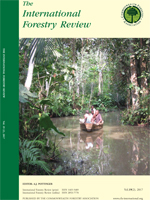Since its emergence largely as a nonstate, market-driven governance system, certification has grown into a complex field in which states also use it as a regulatory instrument. Our research aimed to analyse the impacts of certification initiatives implemented under government control as a mandatory requirement, which remains understudied to date. The Indonesian mandatory forest certification, Pengelolaan Hutan Produksi Lestari (PHPL), was used as a case study. We employed an adapted corrective action requests (CAR) approach based on audit reports. Seventy-eight concessions were audited until December 2015; most of them were eventually granted a PHPL certificate. They scored better on the production aspects than on the main preconditions, social and ecological aspects. Further analysis of the changes in the grades over time showed that the grades across indicators varied, either improving or worsening. Social and ecology-related forest practices appear to be the most challenging aspects in Indonesia, as we found that the grades declined over time despite the fact that the concessions were able to maintain their certification.
How to translate text using browser tools
1 June 2017
What Do Forest Audits Say? The Indonesian Mandatory Forest Certification
A. Maryudi,
H. Kurniawan,
B.D. Siswoko,
W. Andayani,
B. Murdawa
ACCESS THE FULL ARTICLE

International Forestry Review
Vol. 19 • No. 2
June 2017
Vol. 19 • No. 2
June 2017
changes over time
impacts
Indonesia
mandatory certification
PHPL
SVLK




